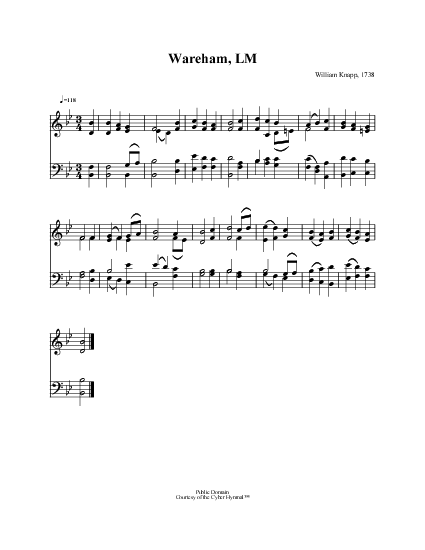Author: James Flint
Flint, James, D.D., born at Reading, Mass., 1779, and graduated at Harvard, 1802. In 1806 he became pastor of a Unitarian Church at East Bridgewater, Mass., from which he passed to East Church, Salem, 1821. Died in 1855. In 1820 he contributed one hymn to Sewell’s New York Collection, and in 1843 he also published A Collection of Hymns, to which he contributed from 10 to 12 originals.
His best known hymns are:—
1. Here to the High and Holy One. This hymn, "On leaving an Ancient Church," appeared in the Cambridge Selection of 1828.
2. In pleasant lands have fallen the lines. Remembrance of our Fathers. Written for the bicentenary of Quincy, Mass., May 25, 1840, and published in his Collection, 1843.
3. Happy t…
Go to person page >Tune
WAREHAM (Knapp)William Knapp (b. Wareham, Dorsetshire, England, 1698; d. Poole, Dorsetshire, 1768) composed WAREHAM, so named for his birthplace. A glover by trade, Knapp served as the parish clerk at St. James's Church in Poole (1729-1768) and was organist in both Wareham and Poole. Known in his time as the "coun…
Go to tune page >
DUKE STREETFirst published anonymously in Henry Boyd's Select Collection of Psalm and Hymn Tunes (1793), DUKE STREET was credited to John Hatton (b. Warrington, England, c. 1710; d, St. Helen's, Lancaster, England, 1793) in William Dixon's Euphonia (1805). Virtually nothing is known about Hatton, its composer,…
Go to tune page >
WARRINGTONWARRINGTON was composed by Ralph Harrison (b. Chinley, Derbyshire, England, 1748; d. Manchester, Lancashire, England, 1810) and published in his collection of psalm tunes, Sacred Harmony (1784). The tune's rising inflections help to accent words such as erotic (probably the only time this word has b…
Go to tune page >


 My Starred Hymns
My Starred Hymns







